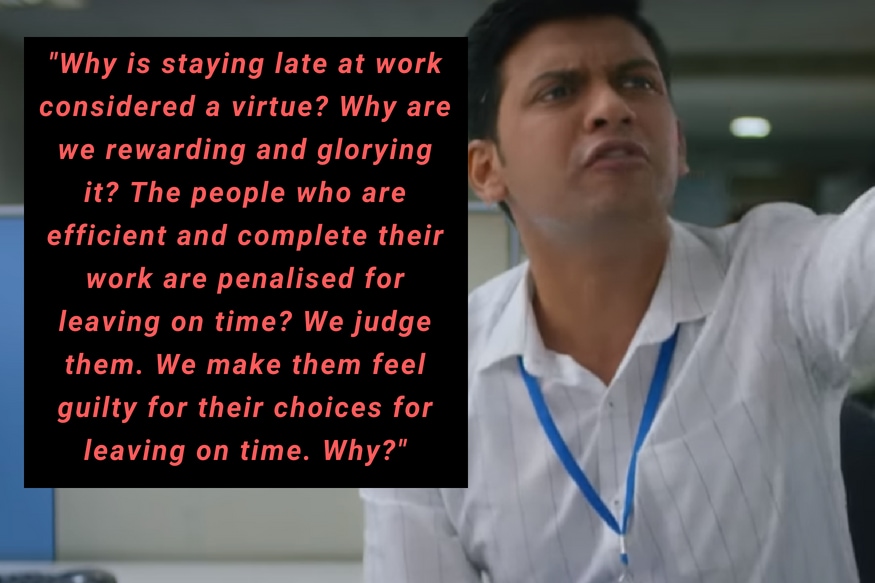‘Fake It, Till You Make It’: The New Funda Of Performative Work, Instead Of Productive Work!
In critical times when our nation is facing unemployment issues and loss of jobs, this is even more disheartening to know that people who are ‘at work’ are actually ‘doing nothing great at work’. As per the survey, the following came out as outcomes that made employees' behaviour as a ‘pretence of being productive’.

Recall this desi advertisement from 2018 where this famous actor, who played the character of an office employee, rants up about the toxic work culture of the office where sitting back late at night, without being actually productive, is accepted as normal. Now the ad, which was supposed to be a source of entertainment, can be witnessed in real life also. A recent global survey depicts that 43% of office employees in India just pretend to be busy and working without actually being productive.

Well, you have heard the phrase, Fake It, Till you Make it; the same concept seems to be applied here. The employees at work engage themselves in performative work rather than doing productive work. Defining ‘performative work’, Derek Laney, Slack’s ‘Technology Evanligist’ for Asia Pacific, said that this act involves spending a maximum portion of time in meetings describing the achievements and accolades rather than focusing on decision-making and addressing issues. Leaders are more likely to judge productivity based on visible activity rather than outcomes, Laney added. This disconnect results in wasted effort as employees strive to perform well in front of their leaders.
Unfortunately, India ranked first among the nine nations analysed for this survey, with 43 per cent, followed by Japan and Singapore with 37 per cent and 36 per cent, respectively. South Korea was given the last position with the United States, with workers in both nations reporting spending only 28 per cent of their time seeming active.
In critical times when our nation is facing unemployment issues and loss of jobs, this is even more disheartening to know that people who are ‘at work’ are actually ‘doing nothing great at work’.
As per the survey, the following came out as outcomes that made employees’ behaviour as a ‘pretence of being productive’.
- 63% said they kept their status online, even if they are not actually working at the moment.

- 53% accepted that they feel pressure to respond the messages quickly, even if they are sent during non-working hours.
- 50% acknowledge the peer pressure to let their colleagues know that they are productive at any time.
Isn’t that strange how people entangle themselves in peer and societal pressures and look productive rather than actually be productive and focus on their career growth?
And if you think it is only employees who are the victims of this web, then wake up; the leaders are also caught in this. The report also mentions that globally, the number of hours spent sending emails and being online is ranked as the topmost method to measure the productivity of leaders. Then of course, the employees are also supposed to be ‘actively influenced’ by these activities.
Why ‘speedy response’ is a way to gauge the productive presence of employees?
The expansion of communication technology, such as email and other online messaging platforms, has made information exchange simpler and faster. Simultaneously, greater connectivity, along with the challenge of assessing real productivity in today’s information economy, has prompted companies to use quickness of response as a proxy for hard effort, signalling to employees that the only way to thrive is to be “always on.”
Employers and corporations should research to minimise the growth of toxic work environments in which workers feel forced to stay connected to their job even when it is not demanded of them.
The tremendous ‘peer pressure’ that starts at teenage and stops nowhere….
Peer influence is a potent force that may impact your behaviour, beliefs, and actions. Although it is more typically mentioned in social situations, peer pressure may be everywhere in a toxic work environment, whether you are feeling compelled to adhere to office culture or working excessive hours to impress. Peer pressure isn’t only for teens; it also follows us into the workplace. Peer pressure has a two-edged sword. Depending on the circumstances, it might have either beneficial or harmful outcomes.

For example, if there is one of your colleague’s birthdays, and your other workmates are asking you to stop by late at night at the office and get involved in celebrations, then this might be good, as this will strengthen your bond and communications with your colleagues. At the same time, if one of your bosses is nagging in the Whatsapp group after working hours for an unachieved target, and everyone is quoting their reasons for their action, you think to stay away and give explanations the next morning at official hours.
But because of peer pressure, you also jump at the conversation, try to prove your point, and just tamper with your good night’s sleep. Yes, that’s the wrong impact of peer pressure.
Conclusion.
Overall, staying committed to yourself is essential, mainly when saying no is tough. Identifying and resisting peer pressure is worthwhile in the long term. Learn to respond responsively rather than quickly. It allows you to be true to yourself while creating a healthy atmosphere.




